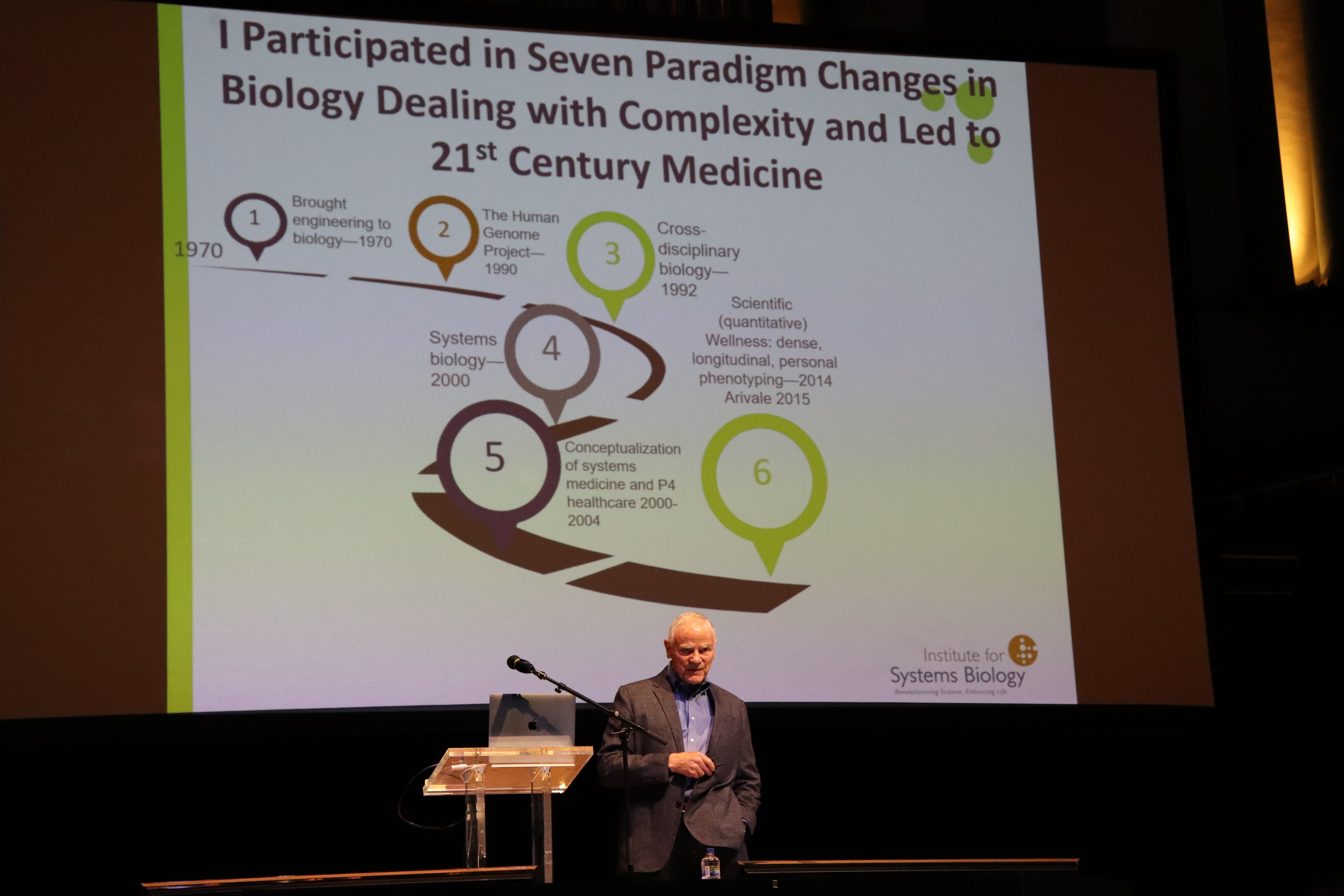Though noble are the stars and captivating is the atom, no field of science holds as much promise as the future of health. Schrödinger at 75 sought to unveil the future of research and development, and how we treat illness. While many speakers focused on the past achievements of research, our persisting attitudes mirror the reactive medicinal approaches of the past few centuries. That was, until Dr. Leroy Hood. Concerned with the concept of scientific (or quantitative) wellness, the talk painted a radical possible trajectory.
Combining detailed family histories, psychological assessment, diet and lifestyle choices, as well as extensive blood analysis, Hood suggested building a profile of who you are and what method is best to achieve your “optimal self”. When used with big data technologies to place you within the population, predicting ailments from minute details in a user’s information would make early intervention par for the course, as we anticipate and prevent diseases before they even manifest. Core to his lecture was the idea that disease should be prevented, not remedied. Sitting in the audience, it was easy to forget what a radical shift from Western medicine’s current paradigm this was, yet its sensibility is undeniable. With positive psychology making similar efforts to promote resilience, building a stronger, healthier individual should lead to reduced costs in treating disorder by preventing it from occurring in the first place. With lifelong care and monitoring, the prevention of debilitating conditions would be revolutionised.
“Predicting ailments from minute details in a user’s information would make early intervention par for the course as we anticipate and prevent diseases before they even manifest.”
Citing examples of the “wellderly”, Hood looked at individuals who far exceeded the mean lifespan and remained in good health with little medical intervention. Hoping to emulate this in the general population, he showed a future where the norm was to live into triple digits. More importantly, however, was living in good health into old age. Rather than prolonging the inevitable, this is about keeping you healthy into seniority, through constant intervention. Hood wants to change the very landscape of medicine. For all of his enthusiasm, however, a discordant note carried between the promises. Not only did Hood extensively promote his own work with the private company Arivale, his approach was inherently biased. Aware that alarmist articles on the future of science are all too common, embracing change is necessary, if often disconcerting. Yet Hood didn’t so much as acknowledge the limitations and ethical dangers inherent in his, or Arivale’s, approach.
“Yet Hood didn’t so much as acknowledge the limitations and ethical dangers.” inherent in his, or Arivale’s, approach.”
If aging and disease can be prevented, then why not? In his track “Korea”, Utah Phillips speaks of a Korean custom at the Imjin river: “When [they] get married [there], the young couple moves in with the elders. But there’s nothing growing, there’s no food. So the first baby that’s born, the oldest, the old man, goes out with a jug of water and a blanket, and sits on the bank of the Imjin river, and waits to die.” Sacrificing themselves for the next generation, the Korean elders roll down the bank of the Imjin river in acknowledgement that their time on Earth is limited. Put more bluntly, in the words of speaker Emma Teeling, aging is beneficial from an evolutionary point of view, but not from that of the individual.
“So the first baby that’s born, the oldest, the old man, goes out with a jug of water and a blanket, and sits on the bank of the Imjin river, and waits to die.”
Just as worrying is who can afford the treatment. Consisting of intervention throughout one’s life, Arivale makes medicine a constant factor. Currently advertised at $200 per month, the benefits are arguably priceless. For those capable of affording the luxury, this may be true. Yet in a society where the rich continue to get richer, the exasperation of the current class divide is terrifying. Cementing the class status perceived as necessary to hold a position of power could lead to a situation allowing for little change and no advancement.
Perhaps Arivale envisions a world where resources are in abundance and overpopulation is a fear of the past. Perhaps they see the “wellderly” as a solution to the growing percentage debilitated from age-related diseases. Perhaps they hope to deliver their treatment to all, regardless of capitalistic constraints. These would be fair justifications, and worthy of debate. Yet rather than discuss, there exists a wilful blindness and optimism of promising a “wellderly” status for those who can afford it. While not limited to Hood’s talk – there were no speakers at the conference on ethics or communication with the public – it was particularly problematic within this context. Subscribing to a lifetime of monitoring and intervention would grant health and permanence, if you can pay the price. Forget the potential class divide or the planet’s diminishing resources. With Arivale, the future is now.






